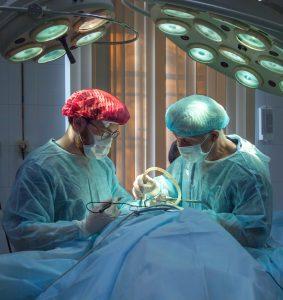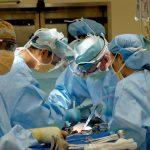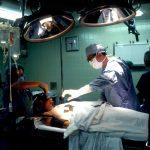-
Skin Cancer Surgery: Preoperative Assessments to Postoperative Care
-
Involving Family and Friends: Support Before and After Surgery
-
Exploring Mohs Micrographic Surgery and Determining Eligibility
-
Postoperative Care: Managing Recovery and Recognizing Side Effects
-
-
What are the essential preoperative assessments and tests for skin cancer surgery?
-
How can I prepare for hospital admission before my skin cancer surgery?
-
What role does a nurse play in my skin cancer surgery journey?
-
What is Mohs Micrographic Surgery for skin cancer? Am I eligible for it?
-
How should I manage postoperative care following my skin cancer surgery?
-
Skin cancer surgery, radiation therapy, and sun are common treatments for various types of skin cancer. Understanding the cancer treatment process and what to expect from the doctor can help alleviate anxiety. This article provides essential information about skin cancer surgery, including the approach, instructions, site, sample, treatment, products, stage, technique, information removal area questions procedure work help tests cases member team stages. ///
If you or a loved one is facing skin cancer surgery or simply wants to learn more about it as a precautionary measure – you’re in the right place for radiation therapy. Scroll down for reviews of our top picks.
Understanding Preoperative Assessments and Tests
Preoperative assessments, tests, and radiation therapy play a critical role in determining the most effective approach for skin cancer surgery. These evaluations are essential for ensuring that the surgical team has a comprehensive understanding of the patient‘s condition, including skin cancers and radiation therapy, allowing them to tailor their approach accordingly.

Physical examinations, including radiation, are an integral part of preoperative assessments as they provide valuable insights into the size, location, and characteristics of the skin cancer. Biopsies are often conducted to confirm the diagnosis and identify specific subtypes of skin cancer, guiding surgeons in planning the appropriate surgical technique. /// Imaging tests such as CT scans or MRI scans may be employed to assess the extent of tumor involvement, its proximity to vital structures, and radiation.
Understanding these assessments, including skin cancers and radiation, is crucial as it ensures that all necessary information is gathered before proceeding with surgery. This knowledge empowers medical professionals to make informed decisions about treatment strategies, minimizing risks and optimizing outcomes for patients undergoing skin cancer surgery. ///
For instance, if a physical examination reveals that a tumor is located near delicate facial nerves or blood vessels, this information will influence how the surgeon plans their incisions and approaches tissue removal during Mohs micrographic surgery for skin cancers.///
Knowing What to Expect at the Pre-Assessment Clinic
At the pre-assessment clinic for skin cancer surgery, healthcare professionals will thoroughly review your medical history and perform necessary tests, including radiation, to ensure you are fit for surgery. This step is crucial in ensuring that any potential risks or complications, such as skin cancers or radiation, are identified and managed before the surgery.
The healthcare team will provide specific instructions on how to prepare for the surgery, including guidelines on fasting, medication adjustments, and any other necessary preparations. Following these instructions diligently can significantly contribute to a successful surgical outcome.
It’s important to come prepared with any questions or concerns you may have regarding the upcoming procedure. Engaging in open communication with your healthcare team during this visit can help alleviate anxiety and ensure that you have a clear understanding of what to expect during and after the surgery.
Patients should also use this opportunity to discuss their recovery plan with their primary care physician if applicable. This ensures seamless continuity of care from pre-assessment through post-operative recovery.
Researching Your Surgeon’s Credentials and Experience
Researching your surgeon’s credentials, certifications, and experience is crucial for a successful skin cancer surgery. Board certification ensures that the physician has met specific standards in their specialty. Look for a doctor who is certified by the American Board of Dermatology or the American Board of Plastic Surgery.
Specialized training in skin cancer surgery indicates that the physician has honed their skills in this particular area. For instance, Mohs surgeons undergo extensive training to perform precise removal of skin cancers while preserving healthy tissue. Opting for a surgeon with specialized expertise can significantly impact the outcome of your procedure.
Positive patient reviews are an essential aspect to consider when researching potential surgeons. Reading about others’ experiences can provide valuable insights into the quality of care and outcomes you can expect from a particular doctor.
Choosing a skilled and experienced surgeon increases your chances of achieving favorable results post-surgery. A study published in JAMA Dermatology found that patients treated by high-volume physicians had lower rates of recurrence compared to those treated by low-volume physicians.
The Role of the Nurse, Dermatologists, and Care Team in Your Skin Cancer Surgery Journey
Nurses are essential in providing care and support throughout skin cancer surgery. They assist with preoperative preparations, ensuring patients understand the procedure and feel comfortable. They educate patients on postoperative care, helping them navigate through the recovery process.
A good rapport with your nurse can significantly enhance your overall experience during skin cancer surgery. Nurses offer emotional support, address concerns, and guide patients through their journey.
Studies have shown that strong nurse-patient relationships positively impact patient outcomes. Patients who feel supported by their nurses tend to have better experiences and improved recovery rates.
Furthermore, nurses play a crucial role in monitoring the progress of surgical wounds and identifying any signs of infection or complications early on. Their vigilance contributes to successful recoveries for skin cancer surgery patients.
Pre-Surgery Nutrition: Eating and Drinking Guidelines
Before undergoing skin cancer surgery, following specific eating and drinking guidelines is crucial for minimizing complications during the procedure. Patients are typically advised to avoid consuming food or drink for a certain period before surgery to prevent aspiration, which can pose risks during anesthesia administration.
Consulting with your healthcare team regarding dietary restrictions is important as they may provide personalized recommendations based on individual health conditions and the type of surgical procedure planned. By adhering to these guidelines, patients can help ensure that their bodies are in the best possible state for the surgical intervention.
Maintaining a healthy tissue environment through proper nutrition plays a significant role in supporting the body’s healing process post-surgery. Foods rich in vitamins C and E, zinc, and protein can aid in wound healing and tissue repair. Staying hydrated by drinking plenty of water before surgery contributes to better overall health and supports recovery.
Incorporating nutrient-dense foods such as leafy greens, lean proteins, fruits, and whole grains into pre-surgery meals can potentially enhance immune function while providing essential nutrients necessary for optimal healing after skin cancer surgery.
Preparing for Hospital Admission: Essential Tips
Proper preparation before hospital admission is crucial for a smooth surgical experience. Arranging transportation, completing necessary paperwork, and packing essential items are key components of this preparation process. Being organized and ready reduces stress and allows you to focus on your recovery.
Here are some essential tips to consider when preparing for hospital admission:
-
Transportation: Arrange reliable transportation to ensure you arrive at the hospital on time. Consider asking a friend or family member for assistance if needed.
-
Paperwork: Complete all required paperwork beforehand to minimize delays on the day of admission. This may include insurance forms, consent documents, and medical history information.
-
Essential Items: Pack necessary items such as comfortable clothing, toiletries, medications (if permitted), insurance cards, identification, and any specific items recommended by your healthcare provider.
Ensuring that these aspects are taken care of in advance can significantly contribute to a smoother experience during hospital admission and alleviate unnecessary stress on the day of surgery.
Packing for Your Stay: What to Bring to the Hospital: protective clothing, medicines, care team, cases.
Packing essential items for your hospital stay ensures comfort and convenience during recovery. Comfortable clothing is crucial, including loose-fitting tops and bottoms that won’t irritate any incisions or bandages. Bringing non-slip footwear can help prevent accidents while walking in the hospital.
Toiletries are also important; pack travel-sized shampoo, conditioner, soap, toothpaste, and a toothbrush. These familiar products can provide a sense of normalcy during an otherwise unfamiliar experience. Furthermore, consider including personal hygiene items like wet wipes or hand sanitizer for added cleanliness.
Personal electronics can make your stay more pleasant by providing entertainment and connection to the outside world. Consider bringing a tablet or laptop with headphones for watching movies or listening to music. However, be sure to check with the hospital regarding their policy on electronic devices as some may have restrictions.
It’s also advisable to bring any necessary medications along with their prescriptions if you’re required to take them regularly. Having these on hand will ensure continuity of care during your stay at the hospital.
Involving Family and Friends: Support Before and After Surgery
Involving family and friends in your skin cancer surgery journey is crucial for emotional support and practical assistance. They can provide comfort, accompany you to appointments, help with daily tasks during recovery, and offer encouragement.
Communicating your needs to your family helps them understand how they can best support you through the process. This open communication strengthens your support system as they become more aware of what you need before and after surgery.
Research has shown that patients who have strong social support tend to experience lower levels of stress during their treatment. Having loved ones involved in the care team also leads to better treatment adherence and improved psychological well-being post-surgery.
Family involvement can be a source of motivation for patients, helping them stay positive throughout their recovery period. It’s important for patients to feel surrounded by love, understanding, and encouragement from those closest to them.
Exploring Mohs Micrographic Surgery and Determining Eligibility
Mohs micrographic surgery, also known as the Mohs technique, is a highly specialized procedure utilized for specific types of skin cancer. This meticulous technique involves removing thin layers of cancerous skin tissue and examining them under a microscope in real-time. By doing so, it allows the surgeon to precisely target affected areas while sparing healthy tissue.
The efficacy of the Mohs procedure lies in its ability to offer high cure rates, often surpassing 90% for certain types of skin cancer. Moreover, it minimizes damage to surrounding healthy tissue, making it an optimal choice for treating cancers on cosmetically sensitive areas such as the face or neck.
Determining eligibility for this procedure requires consulting with a dermatologist or surgeon who will assess various factors including the type and stage of the cancer, its location on the body, and previous treatment history. Generally speaking, individuals with aggressive or recurrent forms of skin cancer are prime candidates for Mohs surgery.

Postoperative Care: Managing Recovery and Recognizing Side Effects
Proper postoperative care is crucial for successful healing after skin cancer surgery. Following wound care instructions, managing pain effectively, and recognizing potential side effects are important.
-
Wound Care: Adhering to the healthcare provider’s wound care instructions is vital for preventing infections and promoting proper healing. This may include keeping the surgical site clean, changing dressings as directed, and avoiding activities that could strain or reopen the incision.
-
Pain Management: Effective pain management can significantly improve the recovery experience. Patients should communicate openly with their healthcare team about any discomfort to receive appropriate pain relief guidance.
-
Recognizing Side Effects: It’s essential to be aware of potential side effects following surgery, such as excessive swelling, bleeding, or signs of infection. Promptly reporting any concerning symptoms to the healthcare provider can help prevent complications.
Regular follow-up appointments allow healthcare professionals to monitor your progress. During these visits:
-
The surgical site will be examined for proper healing.
-
Any concerns or questions regarding recovery can be addressed.
-
Further treatment options or additional procedures may be discussed if necessary based on the patient’s condition.
Conclusion
You’ve now gained valuable insights into preparing for skin cancer surgery, from understanding preoperative assessments to postoperative care. Remember, your health journey is unique, and being well-prepared can alleviate anxiety and contribute to a smoother recovery. As you move forward, ensure you follow the guidelines provided and involve your support system every step of the way. Your proactive approach will play a significant role in your overall experience and healing process.
Take charge of your health by staying informed and taking the necessary steps to prepare for your upcoming skin cancer surgery. Your preparation and proactive involvement will not only ease any apprehensions but also contribute to a successful surgical journey. Stay strong, stay informed, and remember that you have a network of support ready to help you through this challenging yet manageable time.

Frequently Asked Questions
What are the essential preoperative assessments and tests for skin cancers surgery by dermatologists?
Before skin cancer surgery, your doctor may conduct various tests like blood work, imaging scans, and biopsies to assess your overall health and determine the extent of the cancer. These tests help in planning the most effective surgical approach.
How can I prepare for hospital admission before my skin cancer surgery with dermatologists?
Preparing for hospital admission involves organizing essential items such as personal care products, comfortable clothing, and any necessary paperwork. It’s also important to follow specific guidelines provided by your healthcare team regarding eating, drinking, and medication prior to admission.
What role does a nurse play in my skin cancer surgery journey?
Nurses provide crucial support throughout your surgical experience. They assist with preoperative preparations, offer guidance on post-surgery care, monitor your recovery progress, administer medications when needed, and provide emotional support during this challenging time.
What is Mohs Micrographic Surgery for skin cancer? Am I eligible for it?
Mohs micrographic surgery is a precise technique that aims to remove all traces of the tumor while sparing healthy tissue. Eligibility depends on factors like the type of skin cancer you have and its location. Your surgeon will determine if this method is suitable for you based on individual circumstances.
How should I manage postoperative care following my skin cancer surgery, dermatologists?
After surgery, it’s important to closely follow your healthcare provider’s instructions regarding wound care, pain management techniques, activity restrictions or modifications. Additionally be vigilant about recognizing any potential side effects or complications that may arise during recovery.
